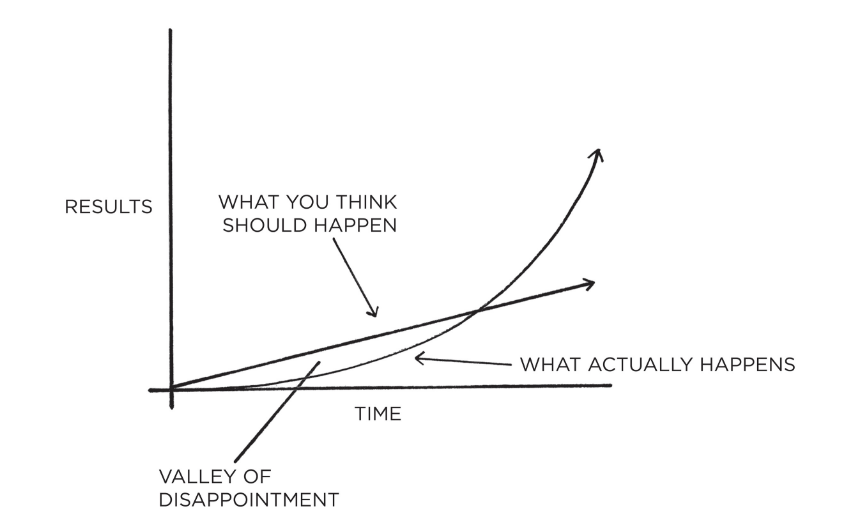What you can expect…
How does the idea of changing your life for the better sound?
Imagine this. You’ve finally decided to quit destructive habits that have held you back for years. You’ve set large, lofty, and highly motivating goals. You’re determined to start moving your life in the right direction. Just imagining this new life floods your brain with so much dopamine.
Unfortunately, this kind of excitement only lasts as long as you continue imagining your future.
Once it’s time to start doing the things you said you’d do to change, that excitement quickly fades away. You’re forced to confront the reality of what your new life will expect from you. Your old, comfortable ways of living will not be tolerated, and while that sounds great, it scares you at the same time.
You’ll have to live up to higher standards. You can’t make excuses, unless you aren’t truly committed to changing. Your internal voice beckoning you to stay in your current position will only grow louder.
Changing for the better is terrifying as well as exciting. Leaving behind your old life means exploring unknown territory. Even though you want to be better, you still have no clue where you’ll be going. Your brain is flooded with inescapable uncertainty.
If your life needs to change, you know it. Here are 4 mindset shifts that will help you overcome your fear of changing for the better:
1. Not Everyone Will Be Happy
You can’t please everyone in life, and you shouldn’t bother to.
There’ll always be people who don’t like whatever you want to do in life. The trick here is knowing this will happen beforehand so you don’t allow it to derail your progress.
When you want to change for the better, those who are content with their current, mediocre way of living will try to bring you down. It hurts them to see you aiming for more as it highlights the inadequacy of their own life. It’s a warning call that they need to change their lives quickly. It’s one they don’t want to hear.
Don’t trap yourself by giving so much attention to other people’s opinions. You can’t waste the “one wild and precious life” you have, as the poet Mary Oliver described it, complying with other people’s arbitrary standards.
You have only one life. Do you really want to waste all of it living how others expect you to? Is social approval going to matter at all when your life is ending?
Be around people who are working to become better as well, not those who want to drag you down. If you surround yourself with the latter, you’ll have to conform to their limiting beliefs. If you never leave them, you’ll imprison your potential for the rest of your life.
2. Not All Your Thoughts Are Valid
Follow this simple principle: don’t believe everything you think.
Your mind will do anything to prevent you from doing the more uncomfortable thing so you face the least resistance. If you really want to change your life for the better, you have to override the software installed in your brain.
Some of your thoughts are merely irrational. Deep down inside, you know what’s best for you. Your true fear isn’t the pain of changing for the better, but the pain of not even trying to. The pain of wasting your whole life, lying on your deathbed one day and wondering how you lost all the time you had so quickly.
Your mind is a beautiful work of art, but it can ocassionally become a cage that tries to protect you (with good intentions) but really just ends up inhibiting your self-growth.
You need to become more aware of your thoughts which is hard.
Practicing meditation helps here. If you don’t like the idea of that, simply allowing your mind to drift off often without any inputs from devices also helps with this.
3. Ask Yourself One Question
Ask yourself this right now: What do I really want out of life?
The author Steven Pressfield wrote in his book The War of Art:
Most of us have two lives. The life we live, and the unlived life within us. Between the two stands Resistance.
I ask you then, which life do you want? You probably have your answer. If you think the effort to get there will be worth the reward, you’ll be motivated to work towards that life.
Ultimately, the choice is up to you. If you’re content with your current life, there’s no problem with that. Chances are that’s not the case though. You likely want to live a better life.
You have the power to change that.
4. Change is Painfully Slow
I’ve been thinking about this idea recently:
There's no such thing as overnight success,
all I know are small, simple steps.
Nobody enjoys making slow progress. It feels good to imagine making smooth, rapid progress, but that’s just a fantasy. Change isn’t a grand thing that just suddenly happens. It’s a slow, hard grind. It requires consistency and dedication. That’s why most people give up so early.
The graph below from James Clear’s book Atomic Habits illustrates this point well. We often expect to make progress at a constant, linear rate but in reality, progress happens very slowly. You’ll be stuck in the valley of disappointment for a long time where your results aren’t quite matching your inputs.

Once your progress takes off exponentially though (which will happen if you stay consistent), you’ll make more progress than you could have even imagined.
Focus on building consistent habits that compound over time and move you slightly closer to where you want to be. Stop doing the wrong things. Start doing the right things.
It’s weird how our minds love overcomplicating everything. We paint pictures in our heads that fool us into believing that change is grander than it really is. It’s quite the opposite: ridiculously simple. So, keep it simple. Move, one step at a time, towards the life you want.
Your Reason to Start
Change is terrifying. It forces you to venture deep into an unknown world.
However, every single successful person you know has had to overcome this fear in order to become better. They’ve experienced the discomfort that comes with starting out as newbies in any domain, having to learn from failure and be humbled along the way.
Desire is a contract you make with yourself to be unhappy until you get what you want, as the entrepreneur Naval Ravikant puts it. When we want to change, we desire a different life. If we never change then, we’ll remain unhappy forever.
Make a start then. Even a small one counts.

Leave a Reply